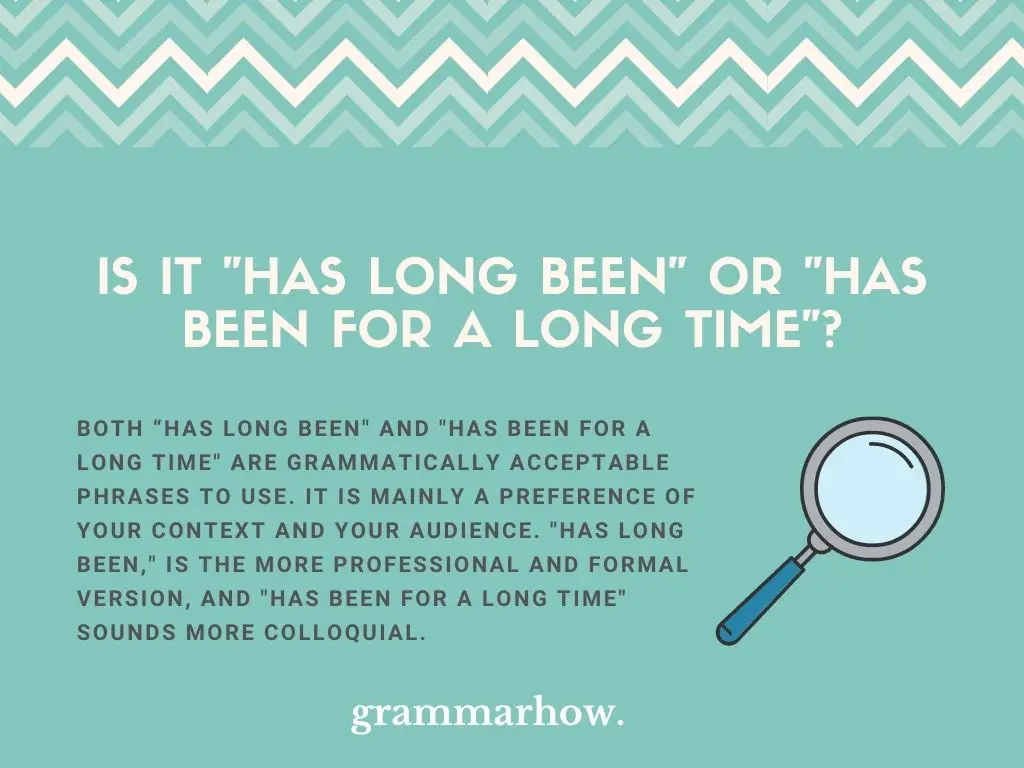Adjectives can sometimes cause confusion when you are deciding where to place them in a sentence. Such is the case with the phrases “has long been” and “has been for a long time.” This article discusses the differences between these phrases and when you should use each.
Is It “Has Long Been” Or “Has Been For A Long Time”?
Both “has long been” and “has been for a long time” are grammatically acceptable phrases to use. It is mainly a preference of your context and your audience. “Has long been,” is the more professional and formal version, and “has been for a long time” sounds more colloquial.

For example, you would be more likely to see “has long been” in a formal paper, speech, or business setting. Whereas “has been for a long time sounds more idiomatic and colloquial.
Keep these things in mind as you choose which one to use. Consider your audience and the tone of the message that you want to convey.
What Does “Has Long Been” Mean?
The phrase “has long been” is another way of saying that something has occurred or is occurring for a significant period of time (a long time). This phrase is quite formal and can tend to sound poetic or outdated and is not typically used in normal everyday conversation.
Here are some examples that show how to use “has long been” in a sentence.
- I have long been wanting to go to that area of the country.
- The continent of Africa has long been a place of mystery and intrigue.
- Putting an evergreen tree in the house has long been a tradition at Christmas.
- New York City has long been considered a place of wealth and success.
- The jalapeno pepper has long been a staple of Mexican cooking.
- Ketchup has long been used on hot dogs.
- This plant has long been used in many natural remedies.
What Does “Has Been For A Long Time” Mean?
The phrase “has been for a long time” means that something has occurred or is occurring for a lengthy time. It is identical in meaning to “has long been,” but is not very formal and is more conversational in nature. You would more likely hear it in everyday speaking.
Here are some examples that show how to use “for a long time” in a sentence.
- That area is known for a lot of crime and has been for a long time.
- Chocolate is my favorite flavor of ice cream and it has been for a long time.
- I told him that it has been like that for a long time.
- The Italian restaurant down the road is popular and has been for a long time.
- My knee is hurting me badly and it has been for a long time.
- That school is well-known for its academics and it has been for a long time.
- Julie is my best friend and she has been for a long time.
Are “Has Long Been” And “Has Been For A Long Time” Interchangeable?
The phrases “has long been” and “has been for a long time” are interchangeable and deciding which one to use is a matter of style preference. As a general rule “has long been” is more formal sounding. “Has been for a long time” sounds less formal and more conversational.
See for example these two sentences. The phrase used does not change the meaning of the sentence.
- It has long been one of my favorite movies that I have ever watched.
- It is one of my favorite movies that I have ever watched and has been for a long time.
Both sentences are saying the same message. The movie is the favorite one that the speaker has watched for a significant period of time.
The tone of the first sentence is polite and formal and the tone of the second one sounds like something that would be said amongst friends.
“Long Been” And “Been For A Long Time” – Synonyms
The following are alternate phrases that you can use which mean the same thing as “long been” and “been for a long time.”
- For as long as I can remember
- Unceasingly
- Has been for ages
- Has been forever
- Endlessly

Martin holds a Master’s degree in Finance and International Business. He has six years of experience in professional communication with clients, executives, and colleagues. Furthermore, he has teaching experience from Aarhus University. Martin has been featured as an expert in communication and teaching on Forbes and Shopify. Read more about Martin here.
